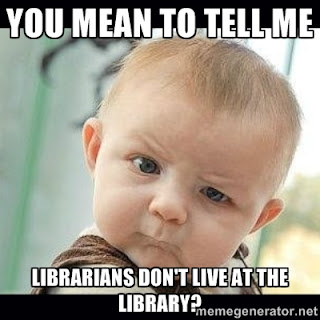A colleague recently shared a 2012 Forbes article written by Sean Devlin entitled: “5 Ways to Stop Desk Intruders”. I found
the title intriguing, as this can be a common problem in many office
environments, and even at our libraries. As we have various roles within our
organization, sometimes we forget that what may constitute “work” for one person may
not for another. For those who work behind a computer, it is important to
remember that it is just that – work. Our lack of walls does not mean that we
are free to invade a person’s work space without asking for permission.
You know the people who somehow figure out exactly when you are at your most productive moment and they intercept it by stopping at your desk (sometimes just to chat), or tap you on your shoulder, or yell your name. They want to see if you got the email they sent earlier or if you can help them later on or if you want to go take a break. Sometimes their requests are important, but mostly for them and without any regard for your current focus. These people are productivity vampires and they come out during the day and they are in offices everywhere.
I can make a confession to you that even on the day of writing this article, I found myself in this category.
1. I walked into the Director's office without knocking, stood by her desk as she was obviously working on finishing an email, and asked her a question about something that was not urgent. (I do this a lot…more confession). What are my options?
- Knock on the door and ask if she has time to talk.
- Peak in the door, and if she’s working, go back to my desk and send a message.
- Send her an email prior to taking the time to go to her office to ask her when she’s free to talk.
- Send all my thoughts to her in an email.
- Realizing they were in a meeting, I just waived, said hi and left.
- I could have returned to my office and gone back to check on them later.
- I could have sent an email to say, “I saw you and Laura were busy. Just wanted to say good morning.”
2. As a supervisor, I walk around the library each morning to check in with those for whom I’m responsible. When I went to the Youth Services Specialist's office, I noticed that she and a co-worker were hovered over a large calendar, obviously discussing a program plan.
When you’re in the zone and absolutely do not want interruption, put a sign on your desk. I know that some Tech Services staff at Linebaugh have adopted this practice, and our Director does it when she’s busy with things like budgets, so I encourage everyone to be aware of signage when you go to approach someone working at their desk or if you want to start using this yourself, notify your colleagues, so they will be on the lookout for the “no interruption” times.
How many times have you chatted with a colleague about something that could have been addressed with a short email? If this persistently happens in a way that keeps interrupting your work flow, tactfully talk with them about how to best communicate with you.
While this can be difficult at every location, there are ways to at least put some kind of barrier between you and potential intruders. Always get your supervisor’s permission first.
Establish times when you have “open-door” opportunities for colleagues and when you need to be left alone. I know for some of our front desk staff at Linebaugh, it is easy to say that the “back of the desk” tasks need to be uninterrupted to enable them to finish the required work in a reasonable amount of time. Unfortunately, these can become some of the most interrupted periods.
As with my above confession, I realized that I do this as much as anyone, and I am sorry to all those I’ve interrupted without considering the value of your time. We are each hired to be productive. Let’s encourage productivity in each other by respecting each other’s time and space.



